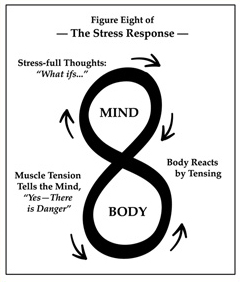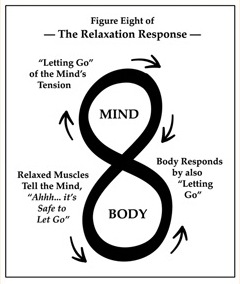Got Stress?
 Traffic jams, short-tempered drivers, frazzled nerves, financial worries, relationship challenges, unrealistic deadlines at work, and endless to-do lists.
Traffic jams, short-tempered drivers, frazzled nerves, financial worries, relationship challenges, unrealistic deadlines at work, and endless to-do lists.
Add to the mix, relentless rushing…rushing…rushing…
while trying to:
- Beat the clock
- Keep up with the speed of technology
- Breathe every so often
Sound familiarly overwhelming?
If so, then welcome to contemporary life, and yes — you’ve “got stress.”
Stress often shows up on two levels:
- Tensions of the mind
- Tensions of the body
Mind stress/tension consists of worrisome thoughts like, “What will people think?” or, “What if I make a mistake?”
Ruminating about problems rather than taking action is another form of mind stress that can result in procrastination.
Body stress often manifests in the form of physical tension. For example, jaw tension, neck tension, and shoulder tension can be indications of body stress.
If we add mind tension together with body tension, then we’ll really be escalating our stress levels! As a result, we may find ourselves breathing shallowly from our upper chests and, at times, unconsciously holding our breaths.
If we keep this unhealthy pace going, we may eventually find ourselves experiencing a Stress Response.
Susan
What’s a Stress Response?
 During a Stress Response the mind and body fuel one another to create a “figure eight” as seen in the illustration here.
During a Stress Response the mind and body fuel one another to create a “figure eight” as seen in the illustration here.
Our stressful thoughts create mind tension that can result in a cycle of stress or a Stress Response. The worrisome thoughts and bodily tensions may be subtle while we’re busy, and then come into our awareness when we’re no longer distracted.
For example, our mind-body agitation may become noticeable while we’re trying to relax or sleep.
Insomnia can be a result of not being able to shut off the worrisome thoughts at bedtime.
Additional common physical symptoms of Stress Responses include:
- Sweating
- Increased heart rate
- Tension around the eyes
The good news is; you can learn to recognize your Stress Responses and utilize mind-body tools to point you in the opposite direction — toward a Relaxation Response.
What’s a Relaxation Response?
 Like the Stress Response, the Relaxation Response is a mind and body issue. At the mind level, we move toward a Relaxation Response by letting go of scary or worrisome thoughts to interrupt the mind’s stress cycle.
Like the Stress Response, the Relaxation Response is a mind and body issue. At the mind level, we move toward a Relaxation Response by letting go of scary or worrisome thoughts to interrupt the mind’s stress cycle.
At the body level, we move toward a Relaxation Response by letting go of muscle tension. Letting go (at both mind and body levels) decreases our heart rates, blood pressure levels, and breathing rates.
Tools to Tame Stress
Trina’s approach to stress management is multi-faceted and addresses the mind’s tension as well as the body’s tension.
In this program, you’ll get leading-edge stress management tools.
Isn’t it time to get that “sack of stress” off your back — so you can breathe easier — and ENJOY your life more?
Call Trina today if you’re ready to GIFT yourself
with empowering, relaxing tools.
(925) 285-5759




